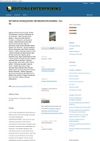 January 2023 in “Editora Enterprising eBooks”
January 2023 in “Editora Enterprising eBooks” Male pattern baldness has a significant psychological impact on those affected.
 August 2024 in “Archives of Dermatological Research”
August 2024 in “Archives of Dermatological Research” Low-dose oral minoxidil is effective and safe for treating androgenetic alopecia.
 19 citations,
January 2007 in “Dermatology”
19 citations,
January 2007 in “Dermatology” Unwanted facial hair significantly impacts over 40% of women's psychological and social well-being, and various treatment options are available.
1 citations,
July 2006 in “Reviews in gynaecological and perinatal practice” The document concludes that hirsutism in women, often caused by PCOS, requires systematic evaluation and can be treated with medications, mechanical removal, or cosmetic methods, with weight loss also being beneficial.
 September 1997 in “JEADV. Journal of the European Academy of Dermatology and Venereology/Journal of the European Academy of Dermatology and Venereology”
September 1997 in “JEADV. Journal of the European Academy of Dermatology and Venereology/Journal of the European Academy of Dermatology and Venereology” Spironolactone is more effective than finasteride in treating excessive hair growth in women.
14 citations,
July 1994 in “Archives of Dermatology”  1 citations,
December 2022 in “Actas dermo-sifiliográficas/Actas dermo-sifiliográficas”
1 citations,
December 2022 in “Actas dermo-sifiliográficas/Actas dermo-sifiliográficas” Sensitive scalp causes discomfort and hair loss, treated with personalized care.
 July 2024 in “Experimental Dermatology”
July 2024 in “Experimental Dermatology” AP collagen peptides help hair grow and improve hair health.

Minoxidil is better for female hair loss without hormonal issues, cyproterone acetate for those with; people with treated congenital heart disease have lower life quality; personality differs in types of infertility; oral terbinafine is best for toenail fungus; bladder training reduces incontinence; nurse clinics help with heart disease; weight loss improves body composition and liver disease; computer training cuts drug errors.
January 2025 in “International Journal of Pharmaceutics” The treatment showed significant hair regrowth in alopecia areata patients without side effects.
 180 citations,
September 1999 in “British Journal of Dermatology”
180 citations,
September 1999 in “British Journal of Dermatology” Hair loss affects self-esteem and quality of life; treatments can help.
 July 2024 in “The journal of investigative dermatology/Journal of investigative dermatology”
July 2024 in “The journal of investigative dermatology/Journal of investigative dermatology” A new wearable device stops hair loss and boosts hair growth safely.
 August 2023 in “The journal of investigative dermatology/Journal of investigative dermatology”
August 2023 in “The journal of investigative dermatology/Journal of investigative dermatology” Ixekizumab may be an effective first treatment for a rare skin condition causing hair loss.
 1 citations,
August 2017 in “Semiotica”
1 citations,
August 2017 in “Semiotica” The paper concludes that breast cancer treatment involves complex interactions between medical symptoms, patient experiences, and commercial influences, requiring a holistic approach.
 July 2007 in “DOAJ (DOAJ: Directory of Open Access Journals)”
July 2007 in “DOAJ (DOAJ: Directory of Open Access Journals)” Female pattern hair loss, common in women, can be treated with oral antiandrogens and topical minoxidil, but these are more effective at preventing further loss than regrowing hair. Other helpful methods include counseling, cosmetic camouflage, and hair transplantation. Treatment must continue for effects to last and it may take up to 2 years to see results.
 18 citations,
March 2003 in “PubMed”
18 citations,
March 2003 in “PubMed” Hair loss in women can be due to abnormal hair growth cycles or damaged hair follicles, with the most common type being androgenetic alopecia; treatment varies by cause, and the psychological impact is significant.
 January 2013 in “Dermatologic Clinics”
January 2013 in “Dermatologic Clinics” Hair disorders need a holistic approach, including medical, cosmetic, and psychological support.
6 citations,
December 2021 in “International Journal of Endocrinology” The genetic variant studied does not affect PCOS symptoms in Kashmiri women.
 228 citations,
February 2003 in “Urology”
228 citations,
February 2003 in “Urology” Androgen deprivation therapy for prostate cancer can cause sexual, physical, and psychological side effects, and doctors should manage these carefully.
 49 citations,
January 2003 in “American Journal of Clinical Dermatology”
49 citations,
January 2003 in “American Journal of Clinical Dermatology” Effective management of children's hair loss involves accurate diagnosis, various treatments, and supportive care.
 18 citations,
June 1988 in “Culture, medicine and psychiatry”
18 citations,
June 1988 in “Culture, medicine and psychiatry” The perception of excessive hair growth in women as abnormal is more influenced by cultural norms than by medical reasons.
 75 citations,
December 2011 in “British Journal of Dermatology”
75 citations,
December 2011 in “British Journal of Dermatology” Female pattern hair loss can be treated with medications, surgery, and cosmetic products, considering its psychological impact.
 30 citations,
November 2008 in “Facial Plastic Surgery”
30 citations,
November 2008 in “Facial Plastic Surgery” The conclusion is that the best approach for treating Female Pattern Hair Loss is a combination of different treatments.
14 citations,
March 2001 in “Psychiatric Services” Older men should openly discuss sexual health with doctors to improve their quality of life.
 12 citations,
May 2005 in “Current obstetrics and gynaecology/Current obstetrics & gynaecology”
12 citations,
May 2005 in “Current obstetrics and gynaecology/Current obstetrics & gynaecology” Hirsutism is too much hair growth in women like the pattern in men, often caused by high male hormones, and can be treated with hormone control and hair removal methods.
 2 citations,
January 2014 in “Springer eBooks”
2 citations,
January 2014 in “Springer eBooks” Polycystic Ovary Syndrome (PCOS) often leads to severe acne, and lifestyle changes and hormonal treatments can help manage it.
 9 citations,
January 1997 in “Gynecological Endocrinology”
9 citations,
January 1997 in “Gynecological Endocrinology” The document concludes that treating androgen excess needs patience, managing expectations is important, and many drugs used are not officially approved, suggesting cosmetic options for mild cases.
 1 citations,
January 2023 in “Life sciences”
1 citations,
January 2023 in “Life sciences” GABA contributes to stress-related hair loss, and ginkgolide A may help treat it.
 January 2021 in “Reactions Weekly”
January 2021 in “Reactions Weekly” Man experienced lasting sexual issues and stress from finasteride, accused doctor of malpractice.
 4 citations,
November 2021 in “Cancers”
4 citations,
November 2021 in “Cancers” The document concludes that understanding and managing hair loss in cancer patients is important, and more research is needed for better treatments.

























